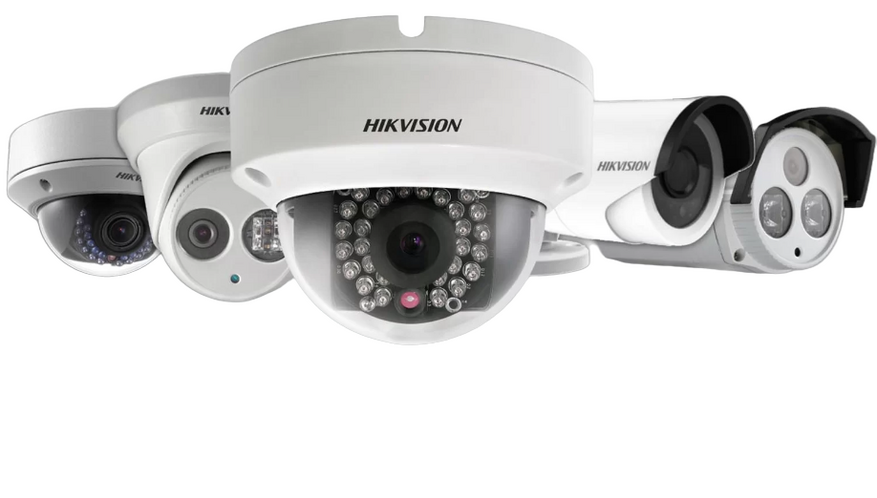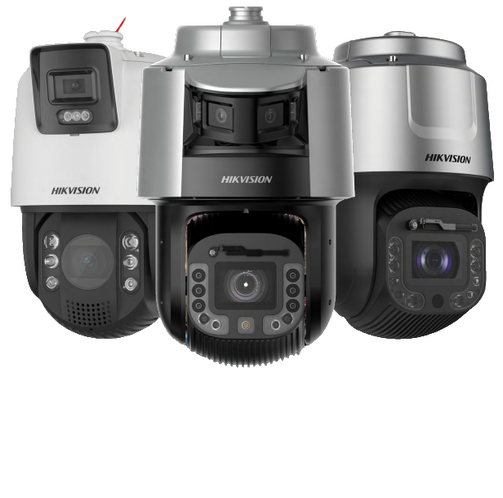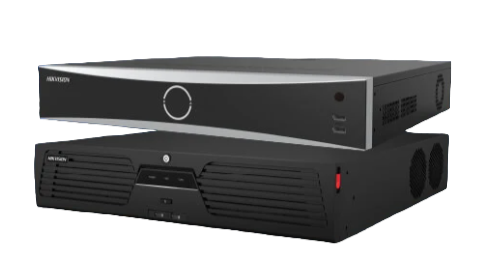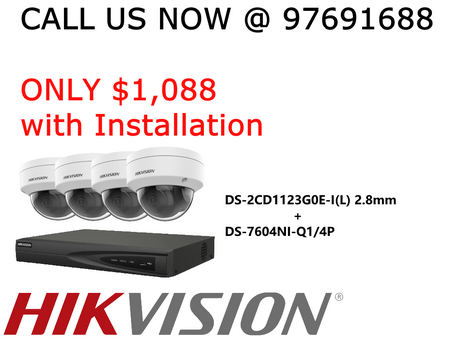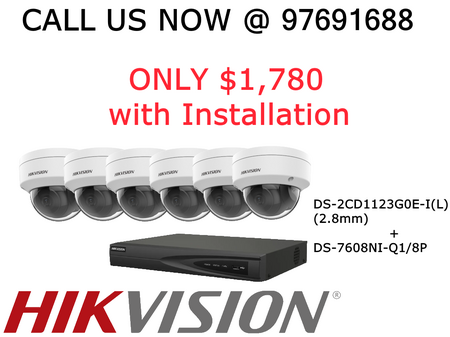Hikvision Specialist
HIKVISION
SPECIALIST

Why CCTV Cameras?
CCTV (Closed-Circuit Television) cameras are used for various security and surveillance purposes. They offer a range of benefits and are commonly employed in both public and private settings. Here are some reasons why CCTV cameras are used:
Crime Deterrence: Visible CCTV cameras can act as a deterrent to potential criminals. Knowing they are being watched can discourage individuals from engaging in illegal activities in the areas covered by the cameras.
Crime Investigation: CCTV footage can provide valuable evidence in the event of a crime. It can capture images and videos of incidents as they unfold, aiding law enforcement in identifying suspects and understanding the sequence of events.
Monitoring and Surveillance: CCTV cameras are used to monitor various locations in real-time. This is useful for situations where constant surveillance is needed, such as monitoring public spaces, retail stores, or industrial facilities.
Employee Monitoring: Businesses use CCTV cameras to monitor employee activities and ensure workplace safety. This can help prevent theft, monitor productivity, and maintain a safe working environment.
Traffic Monitoring: CCTV cameras are often used to monitor traffic conditions and enforce traffic rules. They can provide information on congestion, accidents, and road violations.
Emergency Response: In emergency situations, such as fires, accidents, or security breaches, CCTV cameras can provide real-time information to emergency responders, helping them make informed decisions.
Remote Monitoring: Modern CCTV systems can be accessed remotely, allowing authorized individuals to monitor camera feeds from anywhere with an internet connection. This is particularly useful for businesses with multiple locations or homeowners who want to keep an eye on their property while away.
Loss Prevention: Retail stores use CCTV cameras to prevent theft and shoplifting. The presence of cameras can discourage theft, and recorded footage can be used to identify and apprehend shoplifters.
Safety and Security: CCTV cameras contribute to public safety by monitoring public spaces, transit systems, and critical infrastructure. They can help prevent incidents and respond quickly to emergencies.
Data Collection and Analysis: CCTV footage can be analyzed to gather insights about customer behavior, traffic patterns, and other trends. This information can be used for business planning and decision-making.
Legal and Liability Purposes: CCTV footage can serve as evidence in legal proceedings. It can help resolve disputes, verify claims, and establish facts in legal cases.
It's important to note that while CCTV cameras offer various benefits, their use should be balanced with privacy considerations. Proper placement, data protection measures, and compliance with local laws and regulations are essential to ensure responsible and ethical use of surveillance technology.
Why Access Control Systems?
Access control systems are used to manage and regulate who has access to specific areas, resources, or information within a physical or digital environment. These systems provide an extra layer of security and numerous benefits in various settings. Here's why access control systems are important:
Security Enhancement: Access control systems significantly improve security by allowing only authorized individuals to enter restricted areas. This helps prevent unauthorized access, theft, vandalism, and other security breaches.
Restricted Access: Certain areas, such as server rooms, laboratories, or confidential files, need to be accessible only to specific personnel. Access control ensures that only authorized personnel can enter these areas.
Employee Safety: In high-security environments, such as industrial facilities or research labs, access control systems help protect employees by preventing unauthorized individuals from entering potentially dangerous areas.
Visitor Management: Access control systems can manage visitors by providing temporary access credentials, such as badges or temporary access codes. This ensures that visitors can only access approved areas for a limited time.
Audit Trails: Many access control systems log access events, including who accessed a particular area and when. These audit trails are valuable for investigating security incidents or tracking employee movements.
Time-Based Access: Access control systems can restrict access to certain hours of the day. This is useful for businesses that have specific operating hours or for ensuring that employees only have access during their work shifts.
Remote Access Management: Modern access control systems can often be managed remotely. This allows administrators to grant or revoke access permissions, even when they're not physically present on-site.
Integration with Other Systems: Access control systems can be integrated with other security systems, such as CCTV cameras and alarm systems. This creates a comprehensive security solution that provides a holistic view of the environment.
Compliance and Regulations: In industries that deal with sensitive data or regulated environments, access control systems help organizations meet compliance requirements and adhere to industry regulations.
Loss Prevention: Access control systems deter theft and unauthorized access to valuable assets, helping businesses avoid financial losses and protect their investments.
Customization: Access control systems can be tailored to the needs of the organization. They allow administrators to define different access levels for different employees, ensuring that each person only has access to the areas they require.
Data Protection: In digital environments, access control systems safeguard sensitive information by restricting access to authorized users. This helps prevent data breaches and unauthorized data manipulation.
Reduced Key Management: Access control systems reduce the need for physical keys. This eliminates concerns about lost or stolen keys and the cost of rekeying when personnel changes occur.
Overall, access control systems provide a comprehensive and customizable solution for enhancing security, managing access, and maintaining a safe environment in a variety of contexts, from offices and commercial spaces to industrial facilities and sensitive data centers.
Why Intrusion Alarm Systems?
Intrusion alarm systems, commonly known as burglar alarm systems, are designed to detect unauthorized entry or intrusion into a building or area. These systems play a crucial role in enhancing security and providing early warning of potential threats. Here are the reasons why intrusion alarm systems are important:
Crime Deterrence: The mere presence of visible intrusion alarm systems can deter potential intruders from attempting to break into a property. Knowing that an alarm will sound and authorities will be alerted can discourage criminal activity.
Early Warning: Intrusion alarm systems provide an early warning of unauthorized access. This allows security personnel or homeowners to take immediate action to prevent or respond to a potential break-in.
Immediate Notification: When an intrusion alarm is triggered, it can automatically send notifications to security personnel, property owners, or monitoring centers. This enables a quick response from law enforcement or security personnel.
Protection of Valuables: Intrusion alarm systems help protect valuable assets, whether they're in a residential or commercial setting. This can include electronics, artwork, inventory, and sensitive documents.
24/7 Monitoring: Many intrusion alarm systems can be monitored around the clock by a central monitoring station. This ensures that any alarms are promptly addressed, even when property owners are not present.
Customizable Detection: Intrusion alarm systems offer various detection methods, including motion sensors, door/window contacts, glass break detectors, and more. This allows customization based on the specific security needs of the property.
Integration with Other Systems: Intrusion alarm systems can be integrated with other security systems, such as CCTV cameras, access control systems, and fire alarm systems. This creates a comprehensive security solution that provides a complete view of the situation.
Remote Monitoring: Modern intrusion alarm systems often allow for remote monitoring and control via smartphone apps or web interfaces. This gives property owners the ability to arm or disarm the system remotely and receive alerts in real-time.
Reduced Losses: In the event of a break-in, the rapid response facilitated by intrusion alarm systems can lead to the apprehension of intruders and a reduction in potential losses or damages.
Peace of Mind: Intrusion alarm systems provide peace of mind to property owners and occupants, knowing that they have a reliable defense against unauthorized access.
Insurance Benefits: Some insurance companies offer reduced premiums for properties with professionally monitored intrusion alarm systems. This reflects the decreased risk of theft and property damage.
Personal Safety: In residential settings, intrusion alarm systems not only protect property but also contribute to personal safety. The audible alarm can alert occupants to the presence of an intruder, giving them time to take necessary precautions.
Customizable Zones: Larger properties or businesses can be divided into different security zones, allowing for more targeted monitoring. For example, different zones can be armed or disarmed separately based on occupancy.
Intrusion alarm systems are a fundamental component of a comprehensive security strategy, helping to prevent break-ins, reduce losses, and provide timely notifications in the event of unauthorized access. Proper installation, regular maintenance, and integration with other security measures are key to maximizing the effectiveness of these systems.

